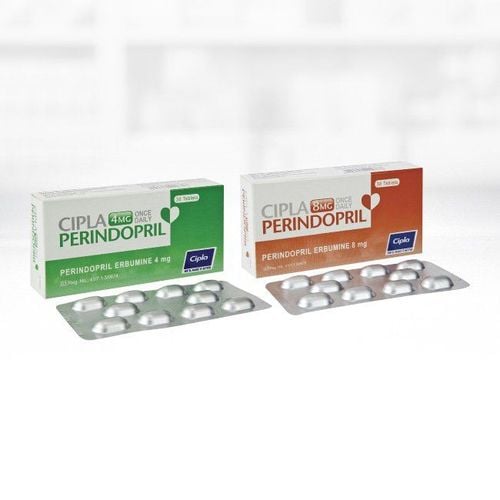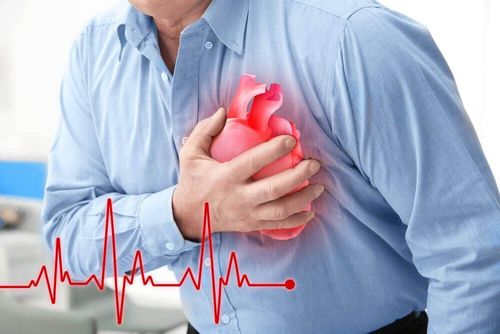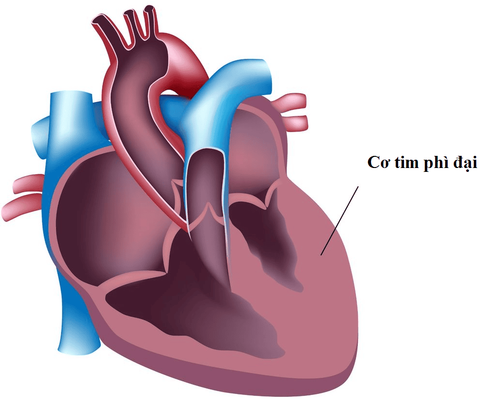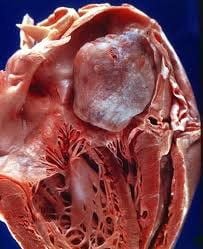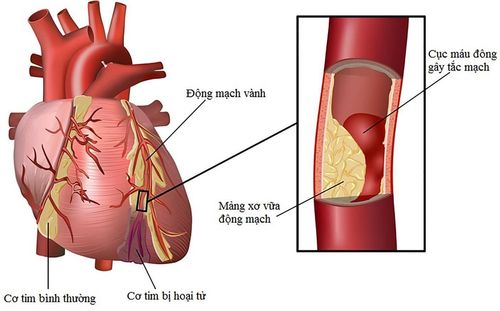This is an automatically translated article.
The article was professionally consulted by Dr. Ngo Dac Thanh Huy - Cardiologist - Department of Medical Examination & Internal Medicine - Vinmec Danang International General Hospital. The doctor has experience and strength in the field of diagnosis and treatment of cardiovascular diseases, echocardiography, coronary angiography and intervention.Hypertrophic cardiomyopathy is a cardiovascular disease associated with genetic factors and has the highest incidence. The disease greatly affects heart function and is a high risk factor for sudden death in young people.
1. What is hypertrophic cardiomyopathy?
Hypertrophic cardiomyopathy is defined as the portion of the heart muscle where the wall of the ventricles thickens but the chambers of the heart do not dilate. In this thick region of myocardium, the muscle cells are arranged in an irregular, irregular arrangement.The disease most commonly affects the left ventricle and especially the interventricular septum (the area of the wall that divides the heart into the right and left sides). This thickening of the heart muscle increases the risk of narrowing or blocking blood flow from the left ventricle to the periphery (aorta). Common sites of hypertrophic cardiomyopathy include: lateral wall, apex, right ventricle, both ventricles, or entire left ventricle.
2. Frequency of illness
Hypertrophic cardiomyopathy is the most common inherited heart disease, affecting about 1 in 500 people. The disease can occur at any age, but occurs most often in children and young adults with an equal ratio of males to females.
3. Causes of hypertrophic cardiomyopathy
This is an inherited heart disease caused by abnormalities in the genes that encode components of the myocardium.Hypertrophic cardiomyopathy is inherited by an autosomal dominant gene. Therefore, when one parent carries the abnormal gene, the chance of passing it on to the next generation is 50%, when the baby is born with this gene, the chance of thickening of the heart muscle can occur at any age. which is common during puberty.
However, not 100% of carriers of the abnormal gene will develop the disease and its severity is difficult to predict. Because this is an inherited disease, the best prevention is still screening for hypertrophic cardiomyopathy in the closest relatives such as children, siblings, and parents.
4. Clinical symptoms of hypertrophic cardiomyopathy
In most cases, the person will have no symptoms or mild symptoms. Common symptoms include:Shortness of breath on exertion, when lying with the head low or, most commonly, sudden paroxysmal nocturnal dyspnea. Signs of fainting or lightheadedness about to faint. Angina occurs with exertion or physical activity. Examination signs:
Carotid pulse bounces rapidly, carotid pulse is 2 peaks. Apex strongly bouncing, 2 or 3 apex. Heart sounds can be heard T4. Ejective systolic murmur along the left sternal border or overflow systolic murmur of apical mitral regurgitation.
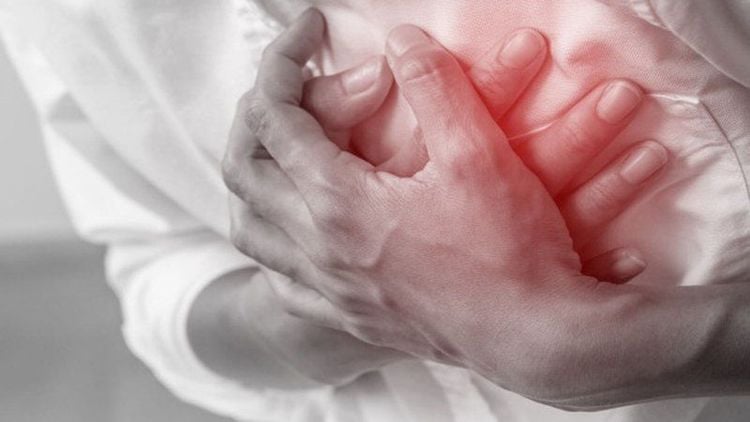
5. Complications of hypertrophic cardiomyopathy
Heart failure This is the most common complication, occurs when the heart's ability to contract and pump blood is weaker than usual due to thick and stiff heart walls. Heart failure is manifested by symptoms such as shortness of breath, cough, edema, nervousness, fatigue...Sudden death This is the most dangerous complication, occurring due to dangerous arrhythmias such as ventricular tachycardia, fibrillation. sudden cardiac arrest. This complication is preventable with implantable defibrillator treatment.
Stroke This is a secondary complication in patients with atrial fibrillation due to hypertrophic cardiomyopathy. At that time, heart chamber thrombosis is easy to form, increasing the likelihood of stroke and can be completely prevented with anticoagulants.
6. Diagnosis of hypertrophic cardiomyopathy
The diagnosis of edematous hypertrophic cardiomyopathy is highly dependent on a thorough history, history, and physical examination, combined with echocardiographic testing.Patient has a family history of hypertrophic cardiomyopathy or sudden unexplained death. Ask about the disease and visit the doctor to find out the signs and symptoms of the disease mentioned above. Perform paraclinical, especially echocardiography to detect and measure the thickness of the heart wall as well as screen for some complications such as heart failure, arrhythmia. In addition, electrocardiogram, CT scan or cardiac catheterization are also indicated when necessary.
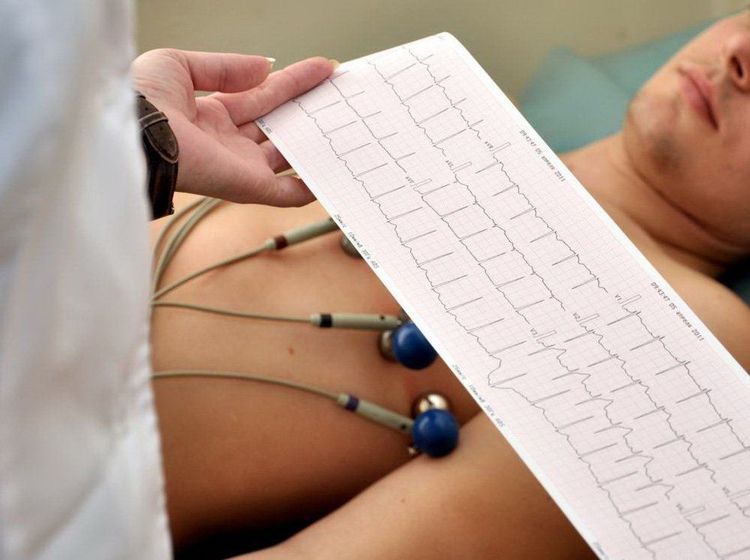
7. Risk stratification in patients with hypertrophic cardiomyopathy
The risk stratification helps to find patients at high risk of sudden death, besides it also helps to determine the treatment direction and preventive measures for the patient. Subjects at high risk of sudden death include:Family history of illness and sudden death. The patient had fainted before. Patients who have ever had or are experiencing arrhythmias such as ventricular tachycardia, ventricular fibrillation. The patient had experienced cardiac arrest and was successfully resuscitated before. Patients with severe heart failure.
8. Treatment of hypertrophic cardiomyopathy
Hypertrophic cardiomyopathy is an inherited heart disease, for which there is no specific cure. The main treatment is to relieve the patient's symptoms and complications, if any. Depending on the disease status and risk stratification, the doctor will apply different treatments such as medication, implantable defibrillator or pacemaker to reduce the risk of sudden death for the patient.Lifestyle changes All patients need lifestyle changes that reduce risk factors for worsening the condition. Do not drink alcohol because it can increase heart rate and blood pressure, making symptoms worse. Reduce caffeine as it can cause jitteriness in some patients who are sensitive to caffeine. Limiting salt and water helps limit the risk of heart failure for patients. Moderate physical activity, exercise every day for about 30 minutes with non-competitive sports such as walking, cycling... Adhering to treatment and regular and scheduled follow-up visits to help monitor symptoms symptoms and complications to detect and treat promptly when there are abnormalities. Beta-blockers, calcium channel blockers, help control heart rate, help the heart muscle relax, and pump blood more efficiently. Anticoagulants, especially vitamin K antagonists, help reduce the risk of blood clots that lead to stroke when patients have cardiac arrhythmias such as atrial fibrillation. Diuretics work to reduce salt and water retention, limiting heart failure. Antibiotic prophylaxis for infective endocarditis.

Cardiovascular screening - Cardiovascular basic examination Package Advanced hypertension examination package Basic hypertension examination package Cardiac arrhythmia screening package Cardiovascular disease Package Cardiovascular Diagnosis - Diagnosis of Syncope Diagnosis Venous insufficiency lower extremity package Heart failure examination package Based on each need and purpose, customers can choose for themselves the appropriate examination package. The team of doctors at Vinmec are well-trained, rich in expertise and experience in the field of cardiology, with a system of advanced and modern medical equipment for high-precision screening results.
Please dial HOTLINE for more information or register for an appointment HERE. Download MyVinmec app to make appointments faster and to manage your bookings easily.





